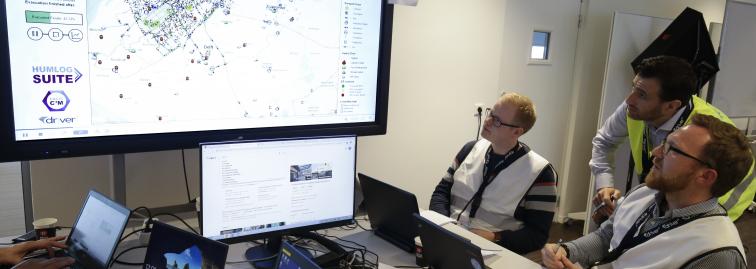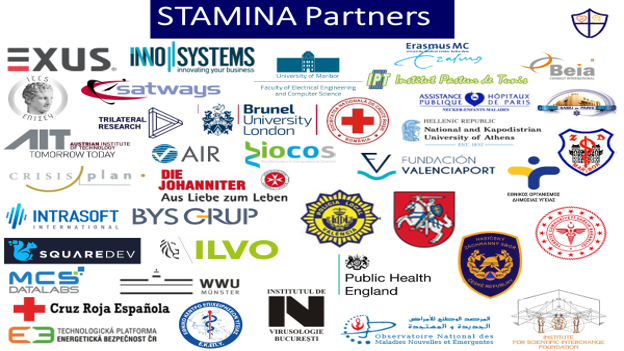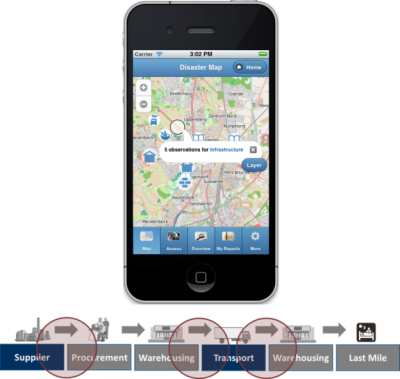
-
OptimAgent: A standardized and model-based framework for decision support in pandemic management
Goals:
Conceptualization of an agent-based simulation system customized for Germany Consideration of innovative approaches and interdisciplinary expertise (epidemiology, infection control, sociology, demographics, health hconomics, machine learning, mathematics) Integration of existing data sets (e.g. COVIMOD, POLYMOD or NET CHECK GPS cellular data)C3M's Role:
Development of a German epidemic micro-simulation System- Requirements analysis
- Conceptualization of the reference model
- Framework and model development
- Model implementation, application and evaluation
OptimAgent's Partners

Project status in progress Project time 05/2022-04/2025 Funding source Federal Ministry of Education and Research -
PROGNOSIS: A simulation-based hospital decision support system
Goals:
Development of a general framework to predict epidemic effects (including in particular pandemic situations) on hospital burden at different levels of care including economic implications on supply chains and human resources- Consideration of short- and long-term scenarios at different geographical levels
- Possibility to simulate different counter-strategies (such as NPI)
C3M's Role:
Sub-project “Epidemic Hospital Resource Demand – Modeling Incidence, Bed-occupancy, Staffing and Supply Chains” Development of a simulation-based hospital decision support system for optimal resource management and allocationPROGNOSIS's Partners

Project status in progress Project time 05/2022-04/2025
Funding source Federal Ministry of Education and Research -
DigCBA: Supporting the selection and use of the most suitable digital technology for delivering Cash-Based-Assistance to refugees

Goals:
Design, development and evaluation of evidence-based frameworks to support the selection and use of the most suitable digital technology for delivering CBA to refugees- Priorization of DigCBA technologies in refugee crises
- Feasibility and readiness knowledge
- Shared understanding among practitioners
C3M's Role:
Application of the TOGAF framework for the Enterprise Architecture of typical DigCBA scenarios Case study based as-is analysis and development of to-be scenarios for DigCBA approaches in refugee crisis context Development of transition plan(s)DigCBA's Partners

Project status in progress Project time 01.11.2021- 31.10.2024 Funding source The Research Council of Norway Keywords Humanitarian Logistics; Cash-based Assistance; Enterprise Architcture -
BISKIT: Blood Information System for Crisis Intervention and Management

Goals:
Conceptualization of an integrated information system for data-driven decision support for South African Blood Supply Chain Management Development of a decision support system covering the inter-organizational donor management, distribution of blood products as well as logistics management Crisis management and contingency plans, including best practices for business continuity and crisis communication strategies See project website for more information: www.biskit.infoC3M's Role:
Extension and application of the simulation environment HumLogSUITE to evaluate promising planning and forecasting methods in the context of various crisis scenarios Application of the TOGAF framework for the Enterprise Architecture of the South-African Blood Supply ChainBISKIT's Partners

Project status finished Project time 01.04.2020- 31.03.2023 Funding source Federal Ministry of Education and Research Project number 13N15214 Keywords Krisenmanagement; Südafrika; Notfall; Krisenintervention; Krisen; Blut; Blutspende; Bluttranfusion; EAM; Enterprise Architecture Management; Informationssystem -
STAMINA: Demonstration of intelligent decision support for pandemic crisis prediction and management within and across European borders

Goals:
- Design and development of an intelligent system to support first responders, practitioners, hospitals and pandemic crisis managers with decision making in the prediction and management of pandemics
- Formulation of guidelines for risk communication and optimal procedures for co-operation between different organizations
- Execution of twelve regional (DRIVER+/STADEM) trials to assess the impact of the developed tools
- See project website for more information: www.stamina-project.eu
C3M's Role:
- Adaptation and application of the DRIVER+ Trial Guidance Methodology Methodological support
- For more information: tgm.ercis.org/

Project status finished Project time 01.09.2020- 31.08.2022 Website https://cordis.europa.eu/project/id/883441/de Funding source EC H2020 - Innovation Action Project number 883441 Keywords Crisis management; Pandemic; Pandemia -
EpiPredict + CoPredict: User-oriented Extension and Automation of Agent-based Software for Pathogen-specific Modelling of Epidemics
Goals:
- Development of a test-bed to evaluate epidemic- and pandemic intervention strategies for deeper understanding of infection dynamics
- Zoonotic pathogens in humans (i.e. influenza & corona viruses)
- Unidirectional transmission from animal hosts to humans (i.e. hanta viruses)
- Bi-directional transmission (i.e. malaria virus)
- Web-based & code-free modeling environment: Collaboration tool for medical experts, information system experts and policy makers
- Reusable and extensible modular software architecture
- Visual analytics to investigate epidemic scenarios
C3M's Role:
- Design, application and evaluation of simulation and collaboration tools
- Intermediary for practitioners and software developers
- Solution provider (EpiPredict Tool)
EpiPredict's + CoPredict's Partners

Project status finished Project time 01.03.2020- 28.02.2022 Funding source Federal Ministry of Education and Research Project number 01KI1913 Keywords epidemics; agent-based modeling; simulation; Sars-Cov-2; covid-19; Zoonotic pathogens - Development of a test-bed to evaluate epidemic- and pandemic intervention strategies for deeper understanding of infection dynamics
-
DRIVER+: DRiving InnoVation in crisis management for European Resilience

Goals:
- Development of a Pan-European Test-bed for Crisis Management Innovations
- Physical & virtual components
- Trial Guidance Methodology (TGM) and Sustainability (CMINE)
- Development of a tested and validated portfolio of crisis management tools
- Solutions for civil resilience and professional response
- Methods and infrastructure for individual and organizational learning
- Organizational, policy & legal tools & standards
- Societal aspects/tools
- Creating a shared understanding of crisis management in Europe
C3M's Role:
- Design, application and evaluation of the TGM
- Practitioner-centered solution review process
- Solution provider (HumLogSUITE, GDACSmobile)
DRIVER+'s Partners

Project status finished Project time 01.05.2014- 30.06.2020 Website http://www.driver-project.eu/ Funding source EC FP 7 - Large-scale integrating project Project number 607798 Keywords Crisis management; Crisis management tools; experimentation campaigns; crisis demonstrations; Humanitarian Logistics - Development of a Pan-European Test-bed for Crisis Management Innovations
-
NITIMesr: A Networked and IT-enabled Firm's Perspective on Crisis Management
Goals:
- NITIM: Graduate School on Networks, Information, Technology & Innovation Management
- 2 Post Docs and 12 PhD students work in the area of Crisis Management Networks within the EU‘s Marie Curie Program
- Focus at ERCIS: dynamics and organization of humanitarian logistics
C3M's Role:
- Supervised NITIMesr PhD projects at C3M
- Governance models for disaster relief operations under the perspective of SCM
- Design and development of a disaster relief SCM system

-
ICT-DM'19: The 4th International Conference on Information on Communication Technologies for Disaster Management
The International Conference on Information and Communication Technologies for Disaster Management (ICT-DM’2017) will be held in Münster, Germany from 11th of December to 13th of December 2017. ICT-DM’2017 aims to bring together academics and practitioners who are involved in emergency services, ad hoc planning and disaster management and recovery, in order to learn about the latest research developments, share experiences and information about this area and develop recommendations.
For more information see: ICT DM'2017
Project status finished Project time 11.12.2017-13.12.2017 Group Chair for Information Systems and Supply Chain Management (Prof. Dr.-Ing. Bernd Hellingrath) Funding source Participant fees Project number none Keywords Crisis Management; ICT; Conference; Humanitarian Logistics -
Epidemics: Application and Improvement of Computational Intelligence Algorithms for Modeling and Optimization of Complex Problems in Supply Chain Planning and Epidemics Forecasting
Planning the activities in a large supply and distribution network is a highly complex task involving a large number of actors, deciding about a multitude of parameters like production and transportation volumes or inventory levels. Current methods being applied are based on classical methods of operations research or different meta-heuristics, resulting very often in not acceptable run times. Besides the sheer complexity of the planning task the involvement of independent actors requires methods of decentralized planning. From the computational side mainly agent-based methods are being applied to cover this aspect. The same complexity is found in epidemiological modeling of viral disease outbreaks, as hidden relations among actors have to be understood for usable forecast to be produced.Regarding the optimization of such complex problems new computational intelligence algorithms (e.g. fish school search - FSS) are promising an efficient computation while on the same time leading to results of high quality. The integration with agent-based social simulation (ABSS) offers new possibilities in describing and understanding the dynamics of, on the one hand, the supply chain planning process between independent actors and, on the other hand, the parameters that control an epidemic spread. Thus we foresee that the hybridization of a swarm intelligence technique and an agent-based technique will be able to tackle the difficulties posed by the selected application problems as they blend fast exploratory capabilities of large search spaces (by FSS) and meaningful representations of spatiality such as neighboring and locality (given by ABSS).In this context the following scientific objectives are approached through the project:- Application of new modeling and optimization techniques within the areas as diverse as supply chain planning and epidemic spread modeling
- Integration of these techniques with the existing state of the art planning and simulation methods in supply chain planning and epidemic spread modeling
- Adaptation and extension of the methods from computational intelligence
- Evaluation of the methods regarding the solution quality and efficiency
- Investigation of further application areas (e.g. logistics in public health) and possibilities for industrial deployment
Project status finished Project time 09/2013-08/2016 Group Chair for Information Systems and Supply Chain Management (Prof. Dr.-Ing. Bernd Hellingrath) Funding source BMBF Project number 01DN13033 Keywords Computational Intelligence; Supply Chains; Epidemics -
Humanitarian Logistics Council of the BVL International
The number of acute and permanent catastrophes has increased by six times in the last forty years. Current examples like the earthquake in North Italy underline once more that measures like an efficient emergency response and a controlled long-term recovery are essential. Up to now, 50 to 80 percent of collected donations raised by aid agencies are spent on logistics. Through better and more cost-efficient processes in logistics great savings can be achieved. This is the starting point for the Humanitarian Logistics Council of the BVL (German Logistics Association).
The Humanitarian Logistics Council is lead by Prof. Dr.- Ing. Hellingrath who holds the Chair for Information Systems and Supply Chain Management at the Westfalian Wilhelms-University in Münster. The council connects about 35 organizations from aid, industry, trade and service, and research.
Objective
The council aims to develop solution approaches for a sustainable improvement of Humanitarian Logistics, which is based on the results of the 1st BVL Humanitarian Logistics Council, which was lead by Prof. Dr.-Ing. Baumgarten from 2010-2011. The results of the 1st council are published in German, as seen below.
Key subjects
1. Platform to support logistics in disaster operations
Conception of a platform for the support of aid agencies through members of the BVL network Identifying a group of experienced logistics experts that are willing to function as advisors for aid agencies or participate actively in disaster operations
2. Internationalization
Transfer of the 1st council’s insights into and further discussions with the international community Invitation of renowned international representatives to council meetings Publication of the council’s results and documentation in English
3. Get Seaports Ready for Disaster
Development of a program for the logistic coordination of seaports in case of disaster Conception of a pilot project with harbor operators and other service providers in logistics
4. Expansion of the IT requirements profile from the 1st council
Identifying and reprocessing the requirements profile for IT systems Consideration of location based services or crisis mapping approaches Creation of a base for technological innovations in context of humanitarian logistics software.
Project status
Finished Project time
05/2012 - 04/2013
Group
Chair for Information Systems and Supply Chain Management (Prof. Dr.-Ing. Bernd Hellingrath)
Funding source
Bundesvereinigung Logistik e.V. / BVL International
Project number
883441
Keywords
Humanitarian Logistics, process analysis, community management, sea-ports

